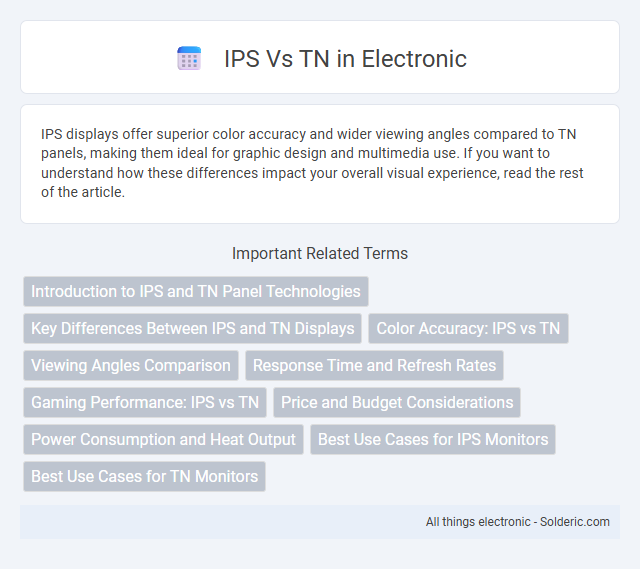IPS displays offer superior color accuracy and wider viewing angles compared to TN panels, making them ideal for graphic design and multimedia use. If you want to understand how these differences impact your overall visual experience, read the rest of the article.
Comparison Table
| Feature | IPS (In-Plane Switching) | TN (Twisted Nematic) |
|---|---|---|
| Viewing Angles | Wide (178deg horizontal and vertical) | Narrow (typically 90deg-110deg) |
| Color Accuracy | High, vibrant colors with better color reproduction | Lower, less accurate colors |
| Response Time | Moderate (4-8 ms) | Fast (1-4 ms), ideal for gaming |
| Contrast Ratio | Average (typically 1000:1) | Higher contrast but can vary |
| Price | Higher due to better image quality | Lower, budget-friendly |
| Use Case | Professional photo editing, general use, media consumption | Competitive gaming, fast-paced action |
Introduction to IPS and TN Panel Technologies
IPS (In-Plane Switching) panels provide superior color accuracy and wider viewing angles compared to TN (Twisted Nematic) panels, which are known for faster response times and lower production costs. IPS technology aligns liquid crystals horizontally, enhancing color reproduction and consistency across the screen, while TN panels twist liquid crystals vertically to achieve quicker pixel transitions. The choice between IPS and TN panels impacts display quality, gaming performance, and budget considerations in monitors and screens.
Key Differences Between IPS and TN Displays
IPS displays offer superior color accuracy and wider viewing angles compared to TN panels, which excel in faster response times and lower input lag. IPS technology uses in-plane switching to maintain consistent image quality and color vibrancy from various angles, while TN (Twisted Nematic) panels rely on quicker liquid crystal orientation changes for rapid screen updates. Gamers often prefer TN monitors for competitive play due to reduced motion blur, whereas IPS screens are favored for professional photo and video editing because of enhanced color fidelity.
Color Accuracy: IPS vs TN
IPS panels deliver superior color accuracy compared to TN panels, offering wider color gamut and better color consistency across viewing angles. TN panels typically exhibit limited color reproduction and suffer from color shifting when viewed off-axis. For tasks demanding precise color fidelity, IPS monitors are the preferred choice over TN technology.
Viewing Angles Comparison
IPS panels provide superior viewing angles compared to TN panels, maintaining consistent color accuracy and brightness up to 178 degrees horizontally and vertically. TN panels exhibit significant color shifting and contrast loss when viewed from wider angles beyond 60 degrees. This makes IPS technology ideal for collaborative environments and color-sensitive tasks where multiple viewers need reliable screen visibility.
Response Time and Refresh Rates
IPS panels typically have slower response times ranging from 4ms to 8ms compared to TN panels, which often offer faster response times as low as 1ms. TN panels also generally support higher refresh rates, commonly up to 240Hz or more, making them ideal for competitive gaming where speed is crucial. For your gaming setup, choosing TN can enhance responsiveness, while IPS provides better color accuracy at the cost of slightly slower response and refresh performance.
Gaming Performance: IPS vs TN
TN panels offer faster response times and higher refresh rates, making them ideal for competitive gaming where every millisecond counts. IPS panels provide superior color accuracy and wider viewing angles, enhancing immersive gameplay but sometimes at the cost of slightly slower response times. Your choice depends on prioritizing speed for fast-paced games or visual quality for a richer gaming experience.
Price and Budget Considerations
TN panels are typically more affordable than IPS panels, making them a popular choice for budget-conscious consumers seeking lower-priced monitors or laptops. IPS displays offer superior color accuracy and wider viewing angles but come at a higher cost, often reflecting in premium pricing. For users prioritizing cost over image quality, TN technology provides a cost-effective solution, whereas IPS panels are ideal for those willing to invest more for enhanced visual performance.
Power Consumption and Heat Output
IPS panels generally consume more power than TN panels due to their complex liquid crystal alignment and backlighting requirements, which can lead to higher energy usage. TN panels are more energy-efficient, resulting in lower heat output during prolonged use, making them suitable for devices with limited cooling capabilities. The increased power consumption of IPS displays often correlates with greater thermal management needs to maintain optimal performance and longevity.
Best Use Cases for IPS Monitors
IPS monitors excel in scenarios requiring superior color accuracy and wide viewing angles, making them ideal for graphic designers, photographers, and video editors. Their consistent color reproduction benefits collaborative work environments where multiple people need to see the screen simultaneously without color distortion. If your work demands precise visuals and vibrant colors, investing in an IPS display enhances both productivity and visual quality.
Best Use Cases for TN Monitors
TN monitors excel in fast-paced gaming and competitive environments due to their ultra-low response times and higher refresh rates, minimizing motion blur and input lag. These panels are cost-effective, making them ideal for budget-conscious users who prioritize speed over color accuracy or viewing angles. If you need a monitor that delivers rapid responsiveness for FPS games or esports, your best option is a TN panel.
IPS vs TN Infographic

 solderic.com
solderic.com